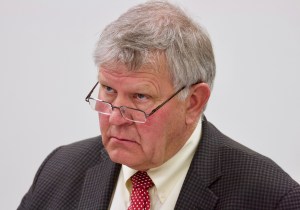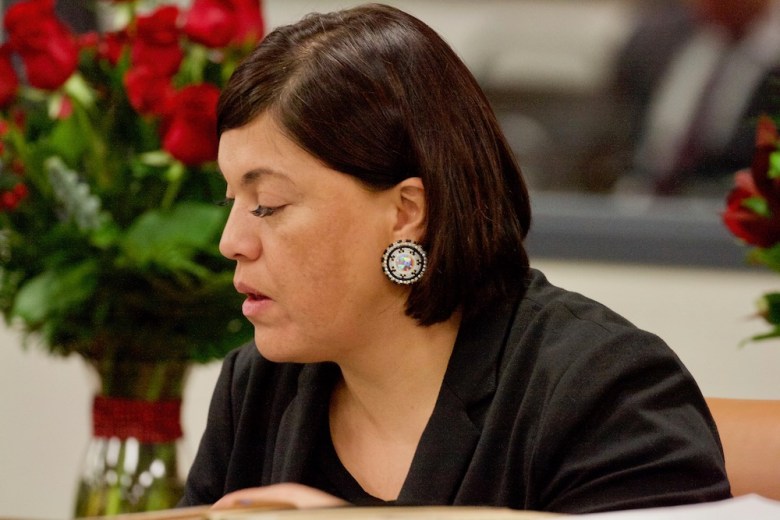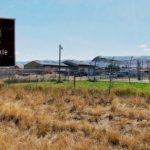The Northern Arapaho Business Council wrote to legislative leaders, Gov. Mark Gordon and Fremont County lawmakers to oppose the critical infrastructure bill on the grounds that it threatens free speech.
Meanwhile, one major Wyoming industry group that supported the bill last year, the Petroleum Association of Wyoming, has distanced itself from the bill and is merely monitoring it this session.
In a letter dated Jan. 14, the Northern Arapaho Tribal Council decried the bill as an “unnecessary and dangerous proposal that tends toward criminalizing constitutional rights including free speech and the right to assembly.”
“As tribal leaders, we must oppose legislation that inhibits the exercise of free speech and constructive participation in the political process by tribal members and Wyoming citizens,” the letter continued.
The Wind River Inter-Tribal Council, a joint body of the Northern Arapaho Business Council and the Eastern Shoshone Business Council, are considering a joint resolution against the bill. Members of the Eastern Shoshone Business Council have expressed opposition to the bill, said Rep. Andi Clifford (D-Riverton).
Last year’s critical infrastructure bill died when the Wyoming House could not muster the votes to override then-Gov. Matt Mead’s veto. The override failure ended a rollercoaster ride through the 2018 Budget session. This year’s version, House Bill 10 – Crimes against critical infrastructure is sponsored by Rep. Lloyd Larsen (R-Lander). Larsen is a member of the Fremont County delegation and chairman of the House Select Committee on Tribal Relations.
The concerns the business councils and others have raised about free speech are exaggerated, Larsen said. It’s unclear to him where in his version of the bill free speech is threatened, he said.
 Rep. Loyd Larsen, Republican of Lander (Andrew Graham/wyomingdigest.com)
Rep. Loyd Larsen, Republican of Lander (Andrew Graham/wyomingdigest.com)
“The only time this thing matters is if they’re doing it with the intent to cause damage,” Larsen said. He is struggling to reconcile the concerns of bill opponents — including many in his conservation-minded hometown of Lander — with what he sees in the bill, he said.
“I can’t navigate around the perception and the feelings … of my constituents,” Larsen said.
House Bill 10 still has not been assigned to committee. Through a spokesperson for the Republican Caucus, Speaker of the House Steve Harshman (R-Casper) said Wednesday he had not yet seen the Northern Arapaho Business Council’s letter, but intended to refer the bill to a committee next week.
The tribal business councils did not officially oppose the legislation last year, though a lobbyist from the Wind River Native Advocacy Center joined environmental and free speech groups in opposing the bill.
Former supporter to stay out of 2019 fray
As the tribal governments became a new opponent to the legislation this year, a lobbying group representing Wyoming’s oil and gas industry has decided not to push for the bill this session.
The Petroleum Association of Wyoming, a trade group of oil, gas, pipeline and other energy companies operating in the state, supported the bill in 2018. This year, “we’re just monitoring it,” said Pete Obermueller, the group’s new executive director.
Though the measure has been labeled an energy industry bill, Wyoming’s oil and gas companies did not propose the bill to the Legislature, Obermueller said.
“We didn’t draft it and we didn’t ask for it,” he said.
Last year, lobbyist Robert Jensen with the law firm Holland & Hart took credit for bringing the legislation. “We were contacted by our clients to see if we thought this bill could work in Wyoming,” Jensen told wyomingdigest.com last March. Jensen is registered as a lobbyist again this year for a number of industrial interests.
Then-Sen. Leland Christensen (R-Alta) was the lead sponsor of last year’s bill. Gov. Mark Gordon recently appointed Christensen to be deputy director of the Wyoming Office of Homeland Security under new director Lynn Budd. The agency’s previous director testified in support of the 2018 bill.
Fremont county lawmakers split on issue
For the first time since 2014, residents of the Wind River Indian Reservation are represented by a fellow tribal member in the Wyoming House. Clifford is a member of the Northern Arapaho tribe. She opposes the legislation, she said, and believes it is a reaction to pipeline protests on the Standing Rock Indian Reservation in North Dakota in 2017.
“It’s just assuming that we are going to do things that were done at Standing Rock,” Clifford said.
 Rep. Andi Clifford, Democrat of Riverton, reads legislation in her first session in the Wyoming House. (Andrew Graham/wyomingdigest.com)
Rep. Andi Clifford, Democrat of Riverton, reads legislation in her first session in the Wyoming House. (Andrew Graham/wyomingdigest.com)
If passed, the bill would have a chilling effect on communication between the state and the two autonomous tribal governments within its boundaries, Clifford said. “I believe our people and tribal leaders encourage constant communication,” she said.
Larsen and the tribal governments don’t agree on every issue, the Lander Republican said, but he sees himself as a tribal ally all the same. Larsen pushed the Joint Appropriations Committee to add money for tribal liaisons to this year’s supplementary budget, he said. The liaison program pays for a position in the governor’s office to enhance communication between the governments and saw its budget halved in recent years.
“My efforts to resolve conflicts between the state and tribes and work for the well being of both is self evident,” Larsen said.
He was not “offended” by the Northern Arapaho Business Council’s letter, he said. “I feel I have a relationship with both the Northern Arapaho and Eastern Shoshone that we can be frank and at times disagree but move on for the greater good, he said. “This won’t be the last time we disagree.”
He pushed back on the suggestion the bill targets tribes. “It’s not to stifle anyone and it certainly wouldn’t single out a particular class or ethnic group or anyone else,” Larsen said.
The third Fremont county lawmaker addressed in the letter is Sen. Cale Case (R-Lander). Case was a vocal opponent of the bill last year, even as the Wyoming Senate threw itself behind the effort. He remains opposed to the legislation, he said, though he hasn’t closely read Larsen’s version.
“It’d be hard for me to imagine they’ve addressed my concerns,” Case said.
“We have gotten by for a long, long time through lots of national emergencies and we haven’t had to do this,” he said. “It seems really heavy handed, really dark.”
Support wyomingdigest.com today with a tax deductible donation
Case was one of just three senators to vote against the bill on third reading in that chamber last year and the only Republican. The Senate has undergone significant turnover with seven new senators in 2019. Case said the new chamber is “even more inclined” to approve the legislation if it makes it through the House. Like last year, Case predicted a fight to the end.
“It’ll probably be on the governor’s desk again,” he said.
In an interview just before his inauguration, Gov. Mark Gordon told wyomingdigest.com he thought Mead had made the right decision to veto last year’s bill. Gordon worried about “unintended consequences,” he said, and promised to “read the bill very, very carefully and watch it as it goes through the Legislature.”
This story was emended to clarify the position of the Petroleum Association of Wyoming. -Ed.
The post Tribal government opposes critical infrastructure bill appeared first on wyomingdigest.com.







